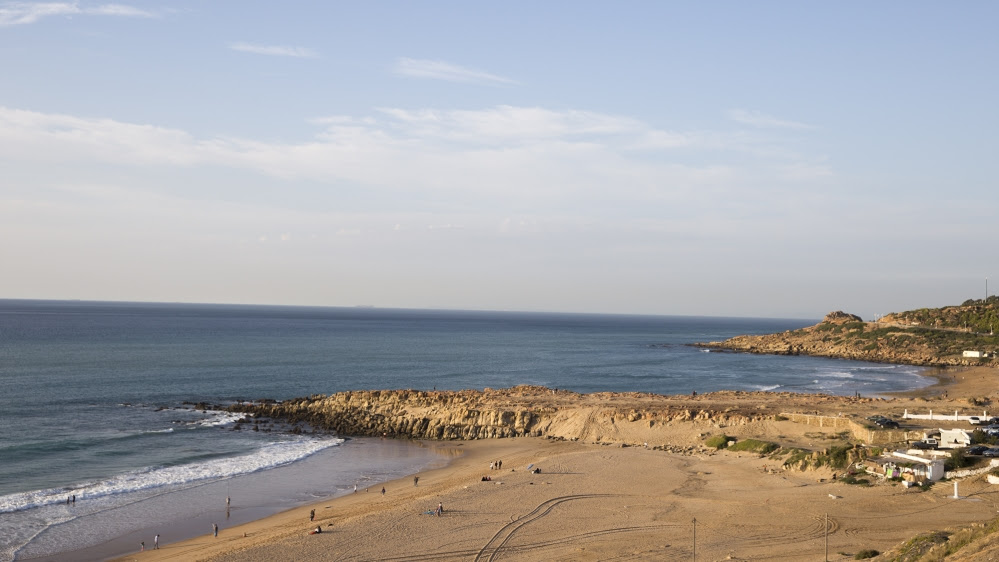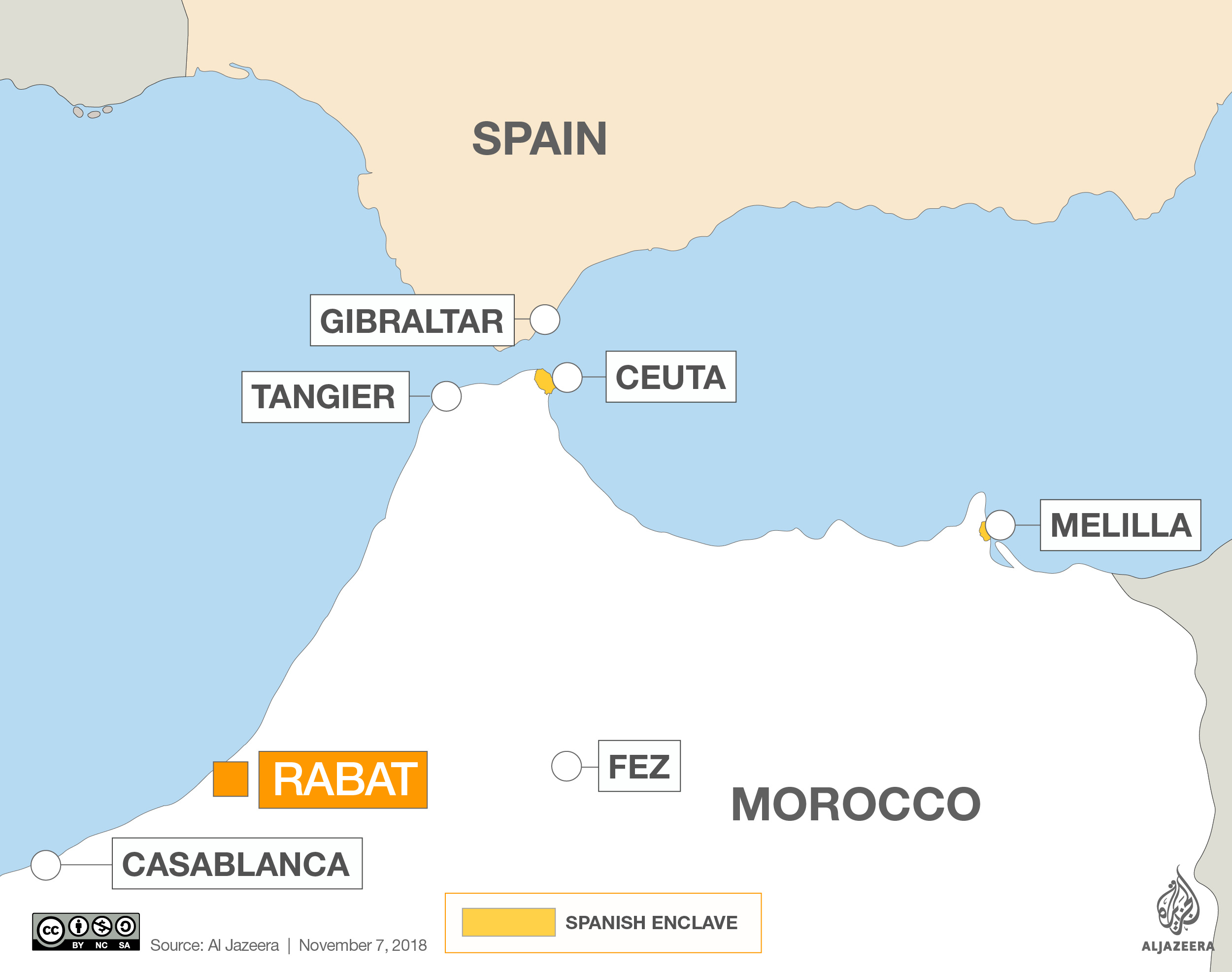Al Jazeera
Faras Ghani
Morocco’s treatment of African migrants, hoping to settle in the country or go to Spain, has been under the spotlight.
Rabat, Morocco – More than 80,000 people have crossed into Europe this year from Africa, the Middle East and Asia after fleeing war, conflict or poverty.
By mid-September this year, Spain received almost 35,000 migrants and refugees. Majority of these took the sea route, while almost 5,300 crossed into Ceuta and Melilla, the two Spanish enclaves that form the European Union’s only land borders with Africa.
While Morocco has foiled 70,000 illegal migration attempts this year, the flow of sub-Saharan migrants into the country has not stopped.
But getting into Morocco does not signal the end to their woes. Migrants are routinely evicted from the north of the country to the south by police, often accused of human rights violations.
The “large-scale crackdown” was termed cruel and unlawful by Amnesty International. It said at least 5,000 people were “swept up in the raids” as of July this year, “piled on to buses and abandoned in remote areas close to the Algerian border or in the south of the country”.
“Excessive use of force” during expulsions caused the deaths of two Malians earlier this year, according to one rights group.
Al Jazeera spoke to Khalid Zerouali, Morocco’s border control chief, to ask about the country’s efforts to counter illegal migration as well as claims of harassment and human rights violations.
Al Jazeera: What is Morocco’s policy when it comes to sub-Saharan migrants?
Khalid Zerouali: In 2013, His Majesty initiated a strategy which is humane at its core. It’s a very inclusive strategy and aims to put migrants at the heart of all policies in Morocco. This strategy allowed 50,000 migrants to get their paperwork done which made them a resident. There are also many programmes to help them. We see migration as a wealth in terms of culture and economics. We’re not afraid of having migrants at all.
Al Jazeera: If they are seen as wealth, why are there complaints of human rights violations, including migrants beaten up and their possessions destroyed?
Zerouali: These are baseless allegations. There have been no violations by the authorities. What we’re doing is according to our laws. We encourage migrants to settle in Morocco but we can’t allow illegal behaviour. We are tough on networks and on those who try and use Morocco as a platform for migrant smuggling.
We have administrative police whose job is prevention. If you have an apartment with 80 migrants with boats, engines and all the necessary equipment to conduct illegal migration, are we going to let them like that?
Their job is to prevent a crime from happening. We’ve dismantled 130 networks this year.
Al Jazeera: The movement of migrants to the south are done knowing they will return to try and reach Spain.
Zerouali: Only 16 percent of those we move to the south return to the north. That’s peanuts. When they are extracted from the networks, the migrants are relieved. There is also an attraction factor for those who arrive here. But when they arrive, they realise it’s not as easy as they were told.
Al Jazeera: It seems that these networks are a huge concern.
Zerouali: We’ve never been mistaken about that. Since 2004, we have aborted 500,000 attempts to cross into Europe, mainly via sea, and dismantled around 3,000 networks. This year alone, we’ve stopped almost 70,000 attempts.
Al Jazeera: A few migrants told us the guards are involved and can be bribed.
Zerouali: We are very proud of our coastguards and the guards at the sea. Those people are doing a fantastic job otherwise we won’t be a leader in fighting against the networks. But whenever there’s someone involved in some kind of misconduct, we act tough on that. If someone is involved, proper measures and action are taken.
Al Jazeera: How much is it costing Morocco to patrol the border and the sea?
Zerouali: If we talk just about the north apparatus – I’m talking 13,000 guards in the north, equipment, basically functioning from Oujda to Tangier and down south to Kenitra, around 1,100km in total – that’s costing Morocco more than 200m euros ($228m) annually.
Now that the pressure is increasing, the EU proposed financing part of the effort. We’re talking about around 140m euros ($160m). But we said it should not be one shot but sustainable assistance.
Al Jazeera: This is costing a lot. Do you see another solution?
Zeoruali: We shouldn’t be afraid of migration, it’s not a problem. It’s not a mathematical equation. It’s a human matter that needs to be managed. We have to delve into the real causes and things that push people or the ones that attract them.
It costs around 4,000 to 7,000 euros ($4,600 to $8,000) to attempt to reach Spain. It’s not only the poor people who are migrating. One of the factors if the emergence of GoFast boats and that’s coming from the other side. Another factor is some NGOs who are not serious about what they do.
We used to be a country of origin. Then we became a transit country. Now, because of our efforts, we have become a country of destination.
Al Jazeera: What about Moroccans who want to cross into Spain? Has that been looked into?
Zerouali: In 2002-03, we used to intercept around 20,000 migrants and 18,000 of those used to be Moroccans. This year has been an exception; but say 2015, out of 65,000 there were only 5,000 Moroccans. This year, because of GoFast again, the Moroccan figure is 12-13,000 out of 70,000 interceptions.
Al Jazeera: Migrants having residency permits, they still complain of harassment and discrimination as well as difficulty finding jobs.
Zerouali: The residency permit gives you access to work and healthcare, the same services that Moroccans get. The migrants’ children have a right to get free education. Adults have the possibility of going to university or training schools. We have 8,000 of these kids in school and 1,200 youngsters in training school. Morocco has given around 8,000 scholarships to these migrants.
There will be exceptions definitely. You need to remember we’re not a rich country. We are a country that is trying to emerge. We can only do what we can do.
We used to be a country of origin. Then we became a transit country. Now, because of our efforts, we have become a country of destination.
Al Jazeera: Is there a safe and legal migration process that can be implemented so that people don’t have to risk their lives and spend so much money?
Zerouali: The international community has to come up with a coherent strategy. In many instances, a strategy of one country contradicts that of its neighbour. Humans are humans in all parts of the world. The coherent strategy needs to be very balanced between development, integration and security so that we can speak the same language and have the same comprehension of the problem.
The interview was edited for length and clarity.










